 Asian Library open hours during the Easter weekend
Asian Library open hours during the Easter weekend
(April 22-25):
Friday: closed
Saturday: 12:00 noon – 5:00 pm
Sunday: closed
Monday: 9:00 am – 5:00 pm
Visit www.library.ubc.ca for branch hours.
 Asian Library open hours during the Easter weekend
Asian Library open hours during the Easter weekend
(April 22-25):
Friday: closed
Saturday: 12:00 noon – 5:00 pm
Sunday: closed
Monday: 9:00 am – 5:00 pm
Visit www.library.ubc.ca for branch hours.
Posted in News/Announcement
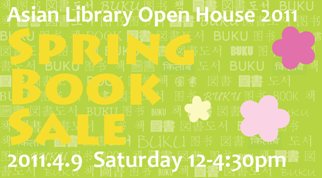
Spring is back, so is our popular annual book sale! As the part II of Asian Library Open House 2011, this book sale carries new, used, and hard-to-find books and magazines in different Asian languages (mainly Chinese and Korean) and some in English. Prices range from 10 cents to $5 but most of them are 50 cents only! You should find books you like! Bring a tote bag with you. ALL ITEMS CASH and CARRY.
Same day at Asian Centre:
IDENTIVERSE: Group Exhibition of UBC 3rd Year Painting & 4th Year Art Theory – Some of the exhibit shown in our Open House Part I continues to be on display on the upper floor of the Library.
Vancouver Mokuyokai’s 27th Annual Ohanami
(Cherry Blossom Viewing Festival)
Celebrate spring under the cherry blossoms with a tea ceremony, garden tour, haiku writing, kamishibai (Japanese storytelling), origami, yukata-dressing, Japanese food and traditional music at UBC Nitobe Garden, an authentic Japanese garden illuminated by lantern-light for this special event. At 6pm, ring the Pacific Bell outside UBC Asian Centre and send your prayers to those affected by Japan earthquake. For details please visit Vancouver Mokuyokai Society’s website.
The Asian Library and the Department of Art History, Visual Art and Theory are pleased to present two displays – Identiverse and Dimensions of the Asian World at UBC – as part of the Asian Library Open House 2011.
DIMENSIONS of the ASIAN WORLD at UBC: A display 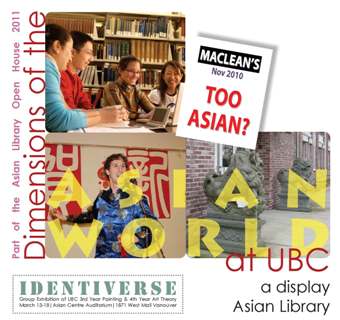
Viewers are invited to conceptualize “Asianness” as a construct in Canada by examining various cultural products – paintings, writings, photographs, quotations, images and video clippings, facts and figures. Alongside the growing Asian student population at UBC is a rich array of Asian-themed activities, the ever-expanding Asian Studies programs and research, and the participation of non-Asian students and staff in these initiatives.
By featuring the 2010 Maclean’s article entitled “‘Too Asian’?” alongside B.C. responses to the segregation of coloured students from Caucasian children in the 1920s, viewers are prompted to ponder the tension between coercive practices of exclusion and assimilation. Excerpts of UBC’s forum on the thought-provoking Maclean’s article, as well as quotes from the Library’s Diversity Caucus discussion on the same piece, capture some thoughts about the Asian world on campus.
Please come and visit the display which is in the foyer of the Asian Centre from March 13, 2011.
INDENTIVERSE: Group Exhibition of UBC 3rd Year Painting & 4th Year Art Theory
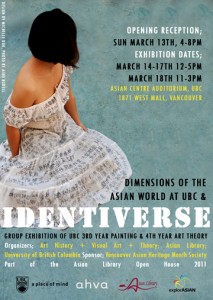 Identiverse, a combination of “identity” and “diversity,” explores the transitions and struggles of ethnic groups regarding their individual and cultural identities. The identities of university students are also examined.
Identiverse, a combination of “identity” and “diversity,” explores the transitions and struggles of ethnic groups regarding their individual and cultural identities. The identities of university students are also examined.
Opening Reception:
Sunday March 13 4-8pm
Exhibition Dates:
March 14-17 12noon-5pm
March 18 11am-3pm
Asian Centre Auditorium & Asian Library Upper Floor
Co-organizers Asian Library | Art History + Visual Art + Theory
Sponsor Vancouver Asian Heritage Month Society
Collaborators Institute of Asian Research | Chinese Language Program, Asian Studies Department | Punjabi Language, Literature & Sikh Studies, Asian Studies Department
Posted in Displays
With the support from a family trust fund, our subscription to Duxiu is paid up and service guaranteed. What is as exciting, if not more exciting is that the Library has also committed to fund the expanded and full access to all 9 China Academic Journal Databases. Now we have access to the China Doctoral and Master Dissertations database; the Conference Proceedings database; the Yearbook full-text database; the Core Newspaper and Reference Works Online databases on top of the 3 journal databases we currently enjoy. Please note that newly named China Knowledge Resource Integrated Database has replaced the former “China Academic Journals.”
Posted in News/Announcement
The mapping of geographic names recorded in the head tax database was launched in the fall of 2008 as one of the “Asian Library’s Partnerships with Communities’ Program Series”. It took 20 rounds of community-based meetings with Taishanese/Zhongshanese-speaking participants to match the towns and villages of origin reported by 90% of the immigrants with the original geographical names in Chinese scripts. With the findings, community members interested in their genealogy, UBC students and indeed scholars from all over the world are able to work toward an international research network for reporting the roots of emigrants from Guangdong, China from 1885-1947, during which head tax was levied on incoming ethnic Chinese. (more)
Posted in Ongoing projects
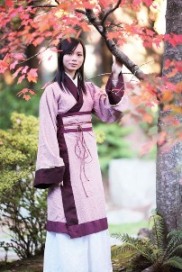 Hanfu or Han Chinese clothing refers to the historical dress of the Han Chinese people (the biggest ethnic group in China), which was worn for millennia before the establishment of the Qing dynasty in 1644. It is a product of collective wisdom and artistry, and can best reflect the ethnicity of Han people. Some other Asian countries like Japan, Korea, Vietnam, Mongolia, and Bhutan also have implemented Hanfu elements in their own clothing.
Hanfu or Han Chinese clothing refers to the historical dress of the Han Chinese people (the biggest ethnic group in China), which was worn for millennia before the establishment of the Qing dynasty in 1644. It is a product of collective wisdom and artistry, and can best reflect the ethnicity of Han people. Some other Asian countries like Japan, Korea, Vietnam, Mongolia, and Bhutan also have implemented Hanfu elements in their own clothing.
Hanfu Club (汉服学社) consists of a group of students who are enthusiastic in the Hanfu culture and wish to revive Hanfu. In collaboration with the Asian Library, they created this exhibit with the aim to introduce the various types of Hanfu with one at a time. The display is set up in the foyer of the Asian Centre and is changed every other week until November.
Posted in Displays
Message from Eleanor Yuen
Head, Asian Library
University of British Columbia
This year, we are celebrating our 50th birthday truly at another new era of knowledge creation and curation.
We know that it is imperative that we revisit our roles, re-configure our service model and repurpose our facilities. From the inception with the amassing of Chinese and Japanese classics in humanities to being the very place that users at UBC and beyond turn to for information on Asia, we have filled our shelves, physical and virtual with more than 580,000 items and delivered information on multiple platforms that is rich with databases, web sites, blogs, videos, images, audios and much more. We respond to users’ changing study habits and demands, face-to-face or online through social networks. Our commitments to the community run deep and we have been welcoming an exponential number of community members. We are privileged to call the beautiful Asian Centre home but we have yet to improve the functionalities of the space and the ambience of the library.
Our 2010 team of ten needs to champion the necessary transition from print to on-line collections and help patrons to adapt to the state-of-art information skills. Predictions about information trends and future technologies may always be fraught with uncertainty. While we are excited by the opportunities on the horizon, we also have to reposition ourselves for the burgeoning virtual world and the growing and diverse user communities that support and challenge us. It is no long satisfying to find strength in the supremacy of number. Rather, with the largest Asian collection in Canada in seven languages as the cornerstone of the library, we must stay forward-looking, courageous, agile and adaptable.
Together with our users, may we strive to bridge Asian culture with that of Canada and indeed North America and be a living library of Asian studies and research in the new era of information ecology.
Could we combine wisdom of the east
with the progress or “push” of the west in a Latin phase of 3 or 4 words
Sketch of UBC Crescent Frank Westbrook fonds, Box 1-17
Omnia mutantur, nos et mutamur in illis.
— All things are changing, and we are changing with them
Cheers to the three “r” s at the Asian Library!
Posted in Events, News/Announcement
In celebration of the Asian Library’s 50th birthday, UBC Library is pleased to announce the Peter Ward Open Essay Contest.
The contest’s theme is “How has the Asian Library helped you achieve your goals?” It aims to challenge students and community users to review their experiences and contemplate the Asian Library’s future. Essay topics on collections, services, facilities, space and your vision of the Asian Library will be accepted.
The winning essayist will receive $500!
At the Asian Library, we strive to bridge Asian, Canadian and North American cultures so we are truly a living library of Asian studies and research. We respond to users’ changing study habits and demands, face-to-face or online. Our commitments to the community also run deep.
We are privileged to call the beautiful Asian Centre home – but we would like to improve the Library’s space and ambience. By sharing your experiences and ideas, you will be part of a milestone in the Asian Library’s development.
ESSAY ENTRY DEADLINE: FEBRUARY 20, 2010
Essay submissions will be judged by a panel of UBC faculty and librarians. Entrants are encouraged to use images, videos, sound files and other formats to illustrate their ideas.
Application Rules:
Peter Ward Essay Contest
The Asian Library
1871 West Mall, Vancouver, B.C. Canada V6T 1Z2
OR submit by e-mail to asian.library@ubc.ca
The winner will be notified by mail or e-mail and invited for the presentation of the award on March 5, 2010 at UBC.
Posted in Events, News/Announcement
Ravinder Ravi is a well-known writer and poet who has more than 80 publications including the famous and well known Restless Soul. He has fully exploited fresh themes and techniques causing him to be the rightful winner of many awards including the Pride of Performance Award, the Fellowship Award, The Best Writer Award as well as the Amrita Pritam Memeorial International Award of Distinction. Ravinder has a unique and bold style and as Dr. Kohli says, he is truly “an experimentalist”.
From now through March 2010, come check out Ravinder Ravi’s collection displayed on the upper floor of Library. For more information, please contact Sarbjit Randhawa, Indic Librarian, at 604-822-2162.
Posted in Displays
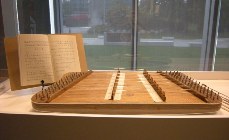
Westernization has been a major process in Chinese music since the beginning of the 20th century, illustrated by the adoption of Western harmony, counterpoint and performance practices. Western elements have also influenced the design of instruments, introducing new sonorities to traditional texture.
Created by the Asian Library, this exhibit includes samples of hammer dulcimers, two-stringed fiddles, three-stringed lutes and a zither, along with scores. It’s believed that Steven Lee, who was an active member in Vancouver’s Chinese community in the 1940s and 1950s, collected these instruments.
You can visit the display, which is in the IKBLC Gallery located on 1961 East Mall [map], until December 7, 2009.
Posted in Displays